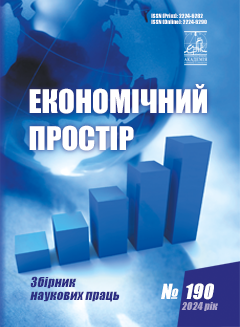ECONOMIC TOOLS FOR STIMULATE THE DEVELOPMENT OF RENEWABLE ENERGY AND INCREASE ENERGY EFFICIENCY IN THE EU
Abstract
The study highlights the pivotal role of tax discounts and financial incentives, alongside support from grants and subsidies, in fostering renewable energy advancements and enhancing energy conservation within the European Union. Instruments for market oversight, including eco-certifications and carbon emission quotas, along with premium rates for green energy, are key to securing investments and project profitability. Levies aimed at environmental preservation push for a shift away from fossil fuels, and the creation of marketplaces for green energy, coupled with the deployment of modern digital solutions and intelligent networks, bolster the production and delivery efficiency of such energy. In the realm of renewable energy application, particularly regarding heating and cooling, Sweden, Estonia, Latvia, Finland, Lithuania, and Denmark stand out as pioneers. Trans-European Energy Networks (TEN-E) play a critical role in enhancing the energy efficiency of the European Union. The integration of TEN-E with renewable energy sources, such as wind and solar, facilitates the transition from fossil fuels to cleaner and more efficient forms of energy. The EU promotes the use of energy service contracts, where energy service companies invest in energy efficiency measures at client sites and receive payment from the energy savings. Tax policies aimed at fostering energy efficiency and the adoption of eco-friendly technologies vary widely across the European Union, reflecting the diverse fiscal strategies of its member states. Nonetheless, several common forms of tax incentives have emerged as popular tools for promoting such initiatives. These include: Providing tax deductions for implementing energy-saving upgrades, Applying lower VAT rates to products and services that conserve energy, offering tax relief or reduced tariffs for the consumption of renewable energy, granting tax advantages to businesses that invest in making their operations more energy-efficient, encouraging the acquisition and use of vehicles and transportation modes that are more energy efficient through tax benefits.
References
European Commission. Directorate-General for Energy. Stimulating consumers’ demand for energy efficiency investments – Final report. June 2023. 2023. 87 p. URL: https://data.europa.eu/doi/10.2833/444676
Tzani D., Stavrakas V., Santini M., Thomas S., Rosenow J., Flamos A. Pioneering a performance-based future for energy efficiency: Lessons learnt from a comparative review analysis of pay-for-performance programmes. Renewable and Sustainable Energy Reviews. 2022. No. 158. DOI: https://doi.org/10.1016/j.rser.2022.112162
Sarker T. The Role of Fiscal Incentives in Promoting Energy Efficiency in the Industrial Sector: Case Studies from Asia. ADBI Working Paper 1172. 2020. URL: https://www.adb.org/publications/role-fiscalincentives-promoting-energy-efficiency-industrial-sector-asia
ECBC. Energy Efficient Mortgages Initiative. Best Practice in European Public Support Schemes for Energy Efficiency. Version: 07/12/2022. 28 p. URL: https://energyefficientmortgages.eu/wp-content/uploads/2023/01/Best-Practice-in-European-Public-Support-Schemes-for-Energy-Efficiency.pdf
International energy agency. Energy Efficiency 2022. 2022. 130 p. URL: https://iea.blob.core.windows.net/assets/7741739e-8e7f-4afa-a77f-49dadd51cb52/EnergyEfficiency2022.pdf
Eurostat. Share of renewable energy in gross final energy consumption by sector. Dataset. Online data code: sdg_07_40. DOI: https://doi.org/10.2908/sdg_07_40
European commission. Trans-European Networks for Energy. 2022. URL: https://energy.ec.europa.eu/topics/infrastructure/trans-european-networks-energy_en
Kyshakevych B., Maksyshko N., Voronchak I., Nastoshyn S. Ecological and economic determinants of energy efficiency in European countries. 2023. Scientific Horizons, no. 26(8), pp. 140–155. DOI: https://doi.org/10.48077/scihor8.2023.140
European Commission (2023) Directorate-General for Energy. Stimulating consumers’ demand for energy efficiency investments – Final report. June2023. 87 p. Available at: https://data.europa.eu/doi/10.2833/444676
Tzani D., Stavrakas V., Santini M., Thomas S., Rosenow J., Flamos A. (2022) Pioneering a performance-based future for energy efficiency: Lessons learnt from a comparative review analysis of pay-for-performance programmes. Renewable and Sustainable Energy Reviews. vol. 158. DOI: https://doi.org/10.1016/j.rser.2022.112162
Sarker T. (2020) The Role of Fiscal Incentives in Promoting Energy Efficiency in the Industrial Sector: Case Studies from Asia. ADBI Working Paper 1172. Available at: https://www.adb.org/publications/role-fiscalincentives-promoting-energy-efficiency-industrial-sector-asia
ECBC (2022) Energy Efficient Mortgages Initiative. Best Practice in European Public Support Schemes for Energy Efficiency. Version: 07/12/2022. 28 p. Available at: https://energyefficientmortgages.eu/wp-content/uploads/2023/01/Best-Practice-in-European-Public-Support-Schemes-for-Energy-Efficiency.pdf
International energy agency (2022). Energy Efficiency 2022. 130 p. Available at: https://iea.blob.core.windows.net/assets/7741739e-8e7f-4afa-a77f-49dadd51cb52/EnergyEfficiency2022.pdf
Eurostat (2024) Share of renewable energy in gross final energy consumption by sector. Dataset. Online data code: sdg_07_40. DOI: https://doi.org/10.2908/sdg_07_40
European commission (2022). Trans-European Networks for Energy. Available at: https://energy.ec.europa.eu/topics/infrastructure/trans-european-networks-energy_en
Kyshakevych B., Maksyshko N., Voronchak I., Nastoshyn S. (2023) Ecological and economic determinants of energy efficiency in European countries. Scientific Horizons, vol. 26(8), pp. 140–155. DOI: https://doi.org/10.48077/scihor8.2023.140



